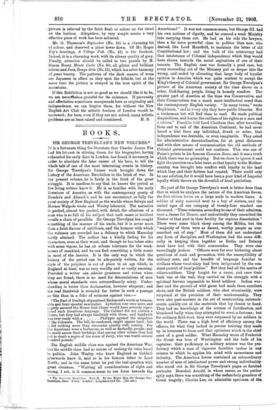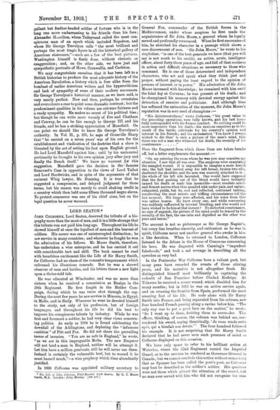BOOKS.
SIR, GEORGE TREVELYAN'S NEW VOLUMES.* IT is a fortunate thing for literature that Charles James Fox bad his lot cast in stirring times, for his biographer, having exhausted his early days in London, has found it necessary, in order to elncidate the later career of his hero, to tell the whole tale of one of the most interesting events in history. Sir George Trevelyan's former work brought down the history of the American Revolution to the brink of war. In the present volume, he is fairly in the thick of the great struggle. It is needless to say that be knows the period as few living writers know it. He is as familiar with the early literature of America as with the contemporary gossip of Brooks's and Almack's, and he can reconstruct as fully the rural society of New England as the worlds where Selwyn and Horace Walpole wrote and Wesley laboured. The narrative is packed, almost too packed, with detail, the allusions of a man who is so full of his subject that each name or incident
recalls a chain of parallels. Sir George Trevelyan has caught something of the manner of his uncle, but it is never more than a faint flavour of antithesis, and the humour with which the volumes are crowded has a delicacy to which Macaulay rarely attained. The author has a kindly feeling for his characters, even at their worst, and though he has taken sides
with some -vigour, he has an urbane tolerance for the weak- nesses of mankind, and he can find something a little comic in most of the heroics. It is the only way in which the history of the period can be adequately written, for the style of the pulpiteer is out of place in an age which, in England at least, was so very worldly and so vastly amusing. Provided a writer can admire greatness and virtue when they are found, there is no need for denunciations of men whose. moral standards were extraordinarily misty. Under- standing is better than declamation, however eloquent; and the real Sandwich is revealed far better in such a passage as this than in a folio of sermons against vice :—
"The Earl of Denbigh stigmatised Richmond's words as treason- able and their speaker as &traitor. Lyttelton rose once more, and eagerly assured the House that Cicero would have severely repro- bated such licentious language. The Cabinet did not contain a Cicero, but they had always Sandwich with them; and Sandwich was ever ready with a . . . . . Philippic against the iniquities of the Colonists. The bill, he confessed, might appear hard; but it did nothing more than encounter cruelty with cruelty. For the Americans were a barbarous, as well as dastardly, people; and he could assure their lordships that among other crimes they had put to death a negro of the name of Jerry, who was worth several hundred pounds."
The English middle class was against the American War, but the middle class had no means of making its voice heard in politics. John Wesley, who knew England as Cobbett afterwards knew it, said so in his famous letter to Lord North; and in the same letter he put the real question with great dearness. "Waiving all considerations of right and wrong, I ask, is it eommon-sense to use force towards the
Tie American revolution. Part n. BS, the Right Hon. Sir George Otto Trevelyau, Bart. 2 vols. Loudon: Longinans and 0o. ,[2]e. zeta ,Americans? " It was not common-sense, but George DT. had his own notions of dignity, and he coerced a weak Ministiy into oarrying them out. He had on his side the lawiers, then a fax more powerful class in politics than 'now, who desired, like Lord Mansfield, to maintain the letter of old Constitutional law ; and the bulk of the aristocracy had that intolerance of Colonial independence which they would have shown towards the social aspirations of one of their tenants. The English case was formally a good case, but every succeeding act of the Ministry put us deeper into the wrong, and ended by alienating that large body of loyalist opinion in America which was quite content to accept the King's theory of Colonial government. Sir George Trevelyan's picture of the American society of the time shows us a sober, God-fearing people, living in homely comfort. The greater part of America at the time was Conservative, and their Conservatism was a much more intellectual creed than the contemporary English variety. "In many towns," wrote Hopkinson, " and in every city they have public libraries. Not a tradesman but will find time to read. He reads political disquisitions, and learns the outlines of his rights as a man and a citizen." Franklin told Lord Chatham that, after travelling from end to end of the American Continent, he had never heard a hint from any individual, drunk or sober, that independence was desirable, or even imaginable. They asked for administrative decentralisation, for at great distances and with slow means of communication the old methods of Colonial government could not continue. This was one of Paine's points in his famous Common Sense, and it was a truth which there was no gainsaying. But we chose to ignore it and. fight the question on a false issue, so that loyalty to the Mother- country was brought into conflict with loyalty to the land which they and their fathers had created. There could only be one solution, for it would have been a poor kind of Imperial loyalty which throve on the downfall of local patriotism.
No part of Sir George Trevelyan's work is better done than that in which he analyses the nature of the American forces, the first citizen levies on a large scale in modern times. A soldier of sixty marched next to a boy of sixteen, and the united ages of one company of twenty-four reached one thousand. ," These veterans, according to one of their admirer* were a theme for Homer, and undoubtedly they resembled the Nestor of that poet in their facility for copious dissertation." There were some black sheep among the Militia, but the "majority of them were as decent, worthy people as ever marched out of step." Most of them did not understand any form of discipline, and Washington had the same diffi- culty in keeping them together as Botha and Delarey must have had with their commandos. They were, also exceedingly jealous. "Officers were for ever bickering about questions of rank and promotion, with the susceptibility of military men, and the breadth of language familiar to civilians whose vocabulary had been invigorated by the con. stant pursuit of local politics." But they had all the merits of citizen-soldiers. They fought for a cause, and once their back was at the wall, they carried on the struggle with a spiritual fervour impossible to hired soldiery. Indian war- fare and the pursuit of wild game had made them excellent shots, and the British soldiers, who shot abominably, were surprised at the precision of their marksmanship. They were also past-masters in the art of constructing entrench- ments quickly out of the materials that lay closest to hand.. They had no knowledge of the science of fortification, and blundered badly when they attempted to erect a fortress; but for ordinary field-work they were surpassed by no soldiers in the world. There was a high level of efficiency among the officers, for what they lacked iu precise training they made up in keenness to learn and that optimism which is the chief asset of a good soldier. What Macaulay wrote of Frederick the Great was true of Washington and the bulk of his captains : their proficiency in military science was the pule ficiency which a man of vigorous faculties makes in any science to which he applies his mind with earnestness and industry. The American forces contained an extraordinary. number of men of intellectual power and strong individuality' who stand out in Sir George Trevelyan's pages as finished portraits. Benedict Arnold, in whose career, as the author aptly says, there was something of the melancholy grandeur of , Greek tragedy; Charles Lee,,an exlmirable specimen of thei
gallant but feather-headed soldier of fortune who is in the long run more embarrassing to his friends than his foes ; Alexander Hamilton, whom Talleyrand called the most con- spicuous man of an epoch which included Napoleon, and whom Sir George Trevelyan calls "the most brilliant and perhaps the most tragic figure in all the historical gallery of American statesmen,"—such are a few of the best pictures. Washington himself is finely done, without rhetoric or exaggeration; and, on the other side, we have just and sympathetic portraits of Howe, Cornwallis, and Carleton.
We may congratulate ourselves that it has been left to a British historian to produce the most adequate history of the American Revolution, a history which is free alike from the bombast of earlier American writers and the hypercriticism and lack of sympathy of some of their modern successors. Sir George Trevelyan's historical manner, as we have said, is very nearly, perfect. Now and then, perhaps, he overstates and overcolours a case to point some dramatic contrast; but the predominant qualities in his volume are extreme fairness and a ready sympathy. He makes no secret of his political bias; but though he can write more warmly of Fox and Chatham and Conway, he can be fair enough to George III. and his friends, and he has a striking appreciation of Mansfield. On one point we should like to know Sir George Trevelyan's authority. In Vol. IL, p. 235, he says of Granville Sharp that "he carried on a seven years' war of his own for the establishment and vindication of the doctrine that a slave is liberated by the act of setting his foot upon English ground. He had Lord Mansfield against him ; until by his undaunted pertinacity he brought to his own opinion jury after jury and- finally the Bench itself." We know no warrant _tit" this suggestion. Mansfield gave the decision in the-famous Somerset's Case in opposition to the views of Lord Talbot and Lord Hardwicke, and in spite of the arguments of that eminent Whig lawyer, Mr. Dunning. It is true that he suggested a compromise, and delayed judgment for three terms, but his reason was merely to avoid shaking credit in a country which then held some fifteen thousand negro slaves. To protect commerce was one of his chief aims, but on the legal question he never wavered.



























































 Previous page
Previous page